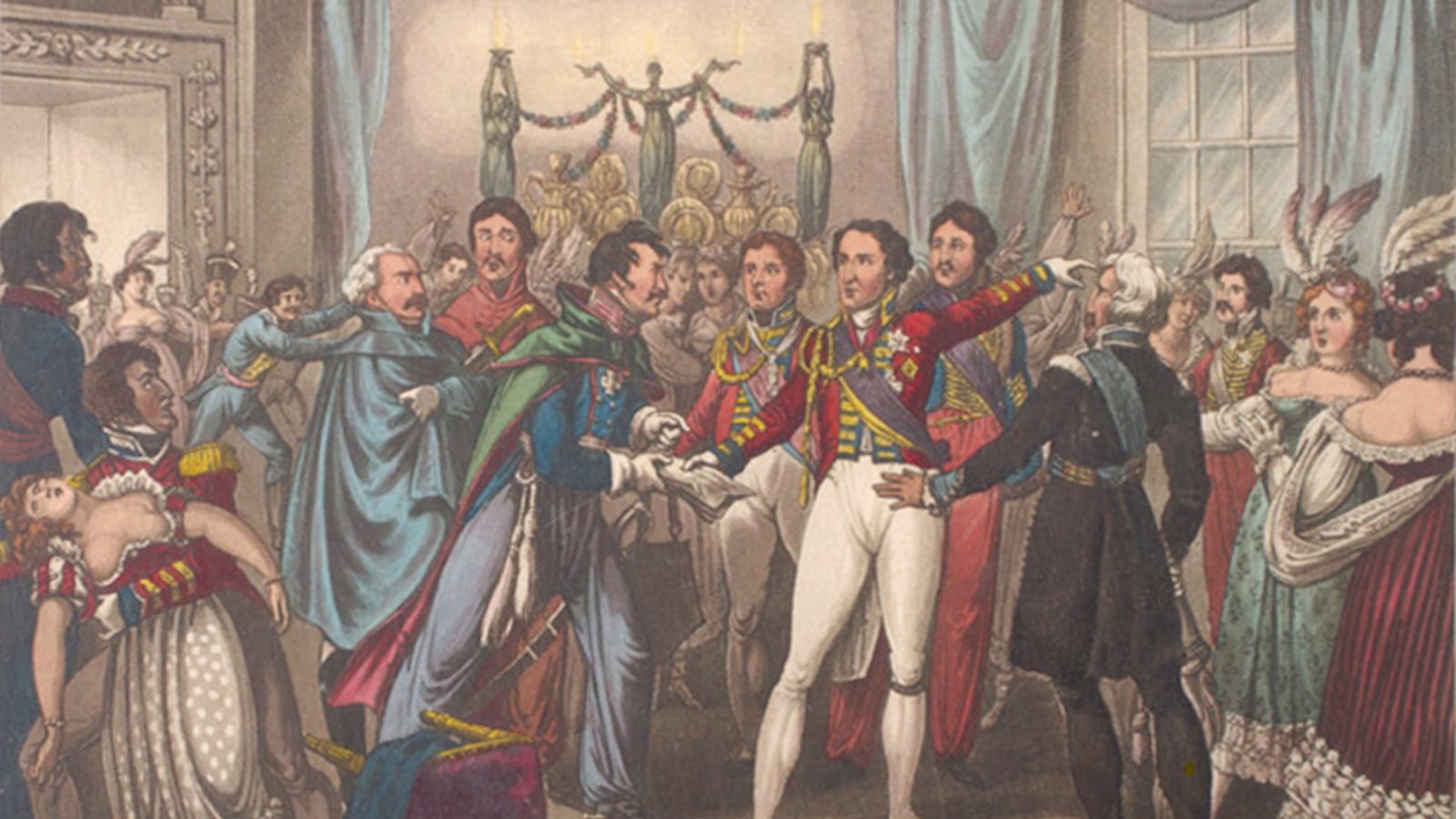The Duchess of Richmond’s Waterloo Ball was described by the historian Elizabeth Longford as “the most famous ball in history”—and, damn it, I could have been there.
Well, not at the 1815 Brussels original, of course, but at its re-enactment in 1969 by Sergei Bondarchuk for Waterloo, a movie in which Christopher Plummer played Wellington, Virginia McKenna the Duchess, and Rod Steiger a doughy Napoleon.
I was covering the production—it was shot in Rome and the Ukraine, then part of the USSR—for the UK’s Telegraph Magazine but I missed the Ball scene somehow.
The original really was the most famous party ever, though, and this at a time when fame was a slower growth but lasted longer.
Byron was quick off the mark, writing it into Childe Harold’s Pilgrimage—which made him into a rock star poet—when the event was still fresh in memory.
Thackeray turned it into a set-piece in Vanity Fair (1848), making his beautiful schemer, Becky Sharp, the belle of the ball.
It was a crucial scene in movies based on the novel, like Becky Sharp, a 1935 RKO production which was also the first full-length Technicolor movie. And, of course, there was the Bondarchuk movie, for which Moscow’s support allowed him so many troops that the director supposedly controlled the seventh largest army in Europe.
Could the reality have been as rich as this? Or, like so much popular history, does the Waterloo Ball scenario consist of a kernel of fact, puffed up by hopes and fears and turned into a useful fable?
There’s important back story. Napoleon escaped from Elba, the islet to which he had been banished by the Allies on February 26 1815. Again the French flocked to him and their king, Louis XVII scuttled.
Napoleon was again at the head of his army but much outnumbered by his enemies, and knew he would have to deal with them one army at a time—including his most formidable enemy, the Duke of Wellington, who was waiting with the British and Dutch armies in Brussels.
Then, as now, Brussels was a cosmopolitan capital, where foreign swells included a Brit community, the leaders of which were the Duke and Duchess of Richmond.
So, the ball. This was held in Wellington’s honor by the Duchess of Richmond on the 15th of June, 1815—this is the Bicentenary plus a week or so—and it was attended by over six hundred guests, including a firmament of European princes and the officers in Wellington’s army.
There was merriment. ” I well remember the Gordon Highlanders dancing reels at the ball,” Lady Louisa, one of the Richmond daughters, would observe later. “There was quite a crowd to look at the Scotch dancers.”
Accounts of the ball do not make it clear just when the rumors began that Napoleon’s army was crossing the Belgian border but clearly news was soon coursing around the ballroom.
It is interesting to learn that Wellington and his intimates didn’t make an entrance until between 11 and midnight. It was remarked upon that he was late, but apparently not particularly so.
Lady Georgiana Lennox, Richmond’s third daughter, and a favorite of the Duke later wrote: “I was dancing but at once went up to him to ask about the rumors. He said very gravely, “Yes, they are true; we are off tomorrow.”
She added, “This terrible news was circulated directly, and while some of the officers hurried away, others remained at the ball, and actually had not time to change their clothes, but fought in evening costume.”
I should say that according to different accounts it was just their evening shoes.
Lord Byron wasn’t there but let’s use his fine eye for detail anyway.
Ah! then and there was hurrying to and fro,And gathering tears, and tremblings of distress,And cheeks all pale, which but an hour agoBlushed at the praise of their own loveliness
Shortly before dinner an aide to the Dutch commander, the Prince of Orange, arrived with a message.
The Prince handed it to Wellington.
It read that the French had forced the Prussians to retreat. Wellington asked the Prince to return to his HQ, then went into dinner, where he sat between Georgiana Lennox—“Georgy”—and another titled Englishwoman.
A further message arrived to the effect that the French were continuing to advance. Wellington made small talk for another twenty minutes, then rose from the table.
Wellington stopped off in Richmond’s dressing room, presumably en route to bed.
Wellington famously said ‘Napoleon has humbugged me, by God; he has gained twenty-four hours march on me… I have ordered the army to concentrate at Quatre Bras; but we shall not stop him there, and if so I must fight him there.”
With his thumbnail, he indicated Waterloo.
Georgiana Lennox and her brother, an aide to the Prince of Orange, helped Wellington pack. But the Waterloo Ball was not quite over.
“We returned to the ballroom, where we found some energetic and heartless young ladies still dancing,” she said. “It was a dreadful evening, taking leave of friends and acquaintances, many never to be seen again.”
The battle of Quatre Bras took place on the morrow. And Waterloo on Sunday June 18. Wellington’s cool had been much remarked on, before these battles generally, his demeanor at the ball specifically.
Nick Foulkes, author of Dancing into Battle: a Social History of the Battle of Waterloo, has been quoted to the effect that this was strategic on the Duke’s part, a decision that it would have been perilous to show nerves.
Foulkes suggests that thus was created “the myth of British imperturbability, the famous stiff upper lip that would come to be identified as the national characteristic of Britain as the century wore on.”
If the stiffness of the national Upper Lip can be assigned a beginning, I think we should also accept that it had an end-date too. Clearly this was the death of Diana. The national upper lip has been sensitive to emotional stimuli ever since.






